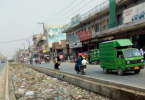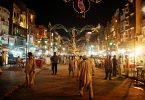Reported in collaboration with Daud Aftab and Muhammad Hassan Ali From Forman Christian College.
Journalists in Pakistan are being coerced by military forces to practice self-censorship when reporting on the country’s religious and security matters.
Media companies are being threatened, and journalists have been attacked as consequences for publishing arguably controversial content, a Committee to Protect Journalists report found.
Public criticism of the army, Inter-Services Intelligence and religion are primarily seen as taboo topics, guidelines on what should be censored are ambiguous and journalists are required to use their discretion on what can and can’t be reported.
Pakistan ranks as one of the most dangerous places in the world to practice journalism with a toll of 34 reported killings between 1992 and 2019, according to figures collected by The Committee to Protect Journalists.
New intimidation methods, such as reduced funding and banning broadcast networks, have been placed on the media as a tactic to induce their silence.
Former News Manager for Geo News Adeel Ahmad Aamir has worked in the Pakistani media for 18 years and says journalists are struggling with self- censorship.
“Now, government and intelligence agencies are dealing with them in different ways. What they are doing is they are not actually giving them advertisements, and advertisements are the lifeline of any tv journalist,” Mr Aamir said.
“When you’re not getting finances from the government, if you are not getting good rates for your advertisements, you are not going to survive in the market.”
Geo TV is an independent network that has often faced periods of blackout from consistently pushing boundaries by exposing unorthodox military activities and religious views.
In 2014 the network was banned by the Pakistan Electronic Media Regulatory Authority for airing blasphemous content and charges were laid against the owner of Geo TV with 26 years of imprisonment.
The underlying reality is that freedom of speech is still disciplined, and journalistic reporting is controlled by parameters set out by legislative and regulatory institutions.
“Your organization thinks if we are going to keep liberal views, we’ll be penalized, so we should not keep liberal views right now, that is self-censorship,”Mr Aamir said.
“To be successful in the Pakistan media as a journalist you need to practice self-censorship. You need to keep your mouth shut.”
Currently journalists and press advocates are fighting back against the facade of press freedom in Pakistan, however, their voices continue to be silenced as the restrictions imposed by the government and intelligence agencies prevent them from critically calling out the faults in Pakistan press media.
“You know everything, you have the knowledge of everything, what is happening, but you are not bringing forth that knowledge, you’re not telling people due to certain fears that is self-censorships,” Mr Aamir said.
Photo credit: Kristina Flour, Unsplash.







